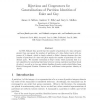Free Online Productivity Tools
i2Speak
i2Symbol
i2OCR
iTex2Img
iWeb2Print
iWeb2Shot
i2Type
iPdf2Split
iPdf2Merge
i2Bopomofo
i2Arabic
i2Style
i2Image
i2PDF
iLatex2Rtf
Sci2ools
COMBINATORICS
2004
2004
Bijections and Congruences for Generalizations of Partition Identities of Euler and Guy
In 1958, Richard Guy proved that the number of partitions of n into odd parts greater than one equals the number of partitions of n into distinct parts with no powers of 2 allowed, which is closely related to Euler's famous theorem that the number of partitions of n into odd parts equals the number of partitions of n into distinct parts. We consider extensions of Guy's result, which naturally lead to a new algorithm for producing bijections between various equivalent partition ideals of order 1, as well as to two new infinite families of parity results which follow from Euler's Pentagonal Number Theorem and a well-known series-product identity of Jacobi.
| Added | 17 Dec 2010 |
| Updated | 17 Dec 2010 |
| Type | Journal |
| Year | 2004 |
| Where | COMBINATORICS |
| Authors | James A. Sellers, Andrew V. Sills, Gary L. Mullen |
Comments (0)

